September 2017 Newsletter
As the September edition of the Toni Times was being prepared, my top-priority bill, SB 2, was still under consideration in the Assembly – the deadline for Senate bills to pass “the other house” is September 15th.
SB 2 – the Building Homes and Jobs Act – is part of a package of bills aimed at addressing California’s severe housing crisis. Gov. Jerry Brown, Senate President Pro Tem Kevin de Leon, and Assembly Speaker Anthony Rendon pledged to make the package a priority during this year’s session’s home stretch.
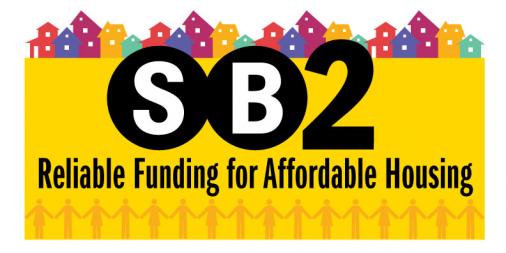 |
SB 2 would create a permanent source of funding for affordable housing. The bill would raise roughly $250 million annually to provide homes for struggling families, seniors and people experiencing chronic homelessness. The revenue would come from a $75 fee imposed on the filing of certain real-estate documents. SB 2 would exempt all property sales from the fee.
Coupled with an additional $4.6 billion in leveraged funding over five years, SB 2 would create tens of thousands of new homes and good jobs. That means it would spur economic activity in communities up and down the state, in addition to ending housing instability for many Californians
SB 3 and SB 35 are the other bills in the package. SB 3 would place a $3-billion bond measure on the November 2018 ballot to fund statewide housing programs. SB 35 would streamline the approval process for projects in cities that are not meeting state-mandated housing goals at various affordability levels.
The situation in California is dire, and San Diego is feeling it. The median rent in our region has risen 36 percent since 2000. At the same time, the median household income for renters has increased just 4 percent. Our lowest-income earners spend nearly 70 percent of their income on housing. To meet demand for middle- and working-class housing, we’d need to immediately create 142,000 rental units.
We are building housing locally, but mostly it’s being built for wealthy residents. Relatively speaking, only a small amount is being built for the middle class and the working poor.
This package of bills won’t instantly solve the housing crisis, but it will help. It attacks the problem with a mix of funding and regulatory reform, making it easier to build more housing in the right locations and provide homes quickly for residents who are struggling the most. Funding will always be needed – there will always be people who are priced out of the housing market.
Back in July, I helped cut the ribbons on two affordable-housing projects – Talmadge Gateway and Cypress Apartments – that will provide a total of 122 new homes in San Diego for people who are representative of those who will always need help: seniors on fixed, low incomes and folks who had been homeless and who suffer from difficult, chronic medical issues. I met people who were grateful to be moving in.
Those two projects are exactly the kinds of projects that my bill, SB 2, would help finance. We need more of them – in San Diego County and throughout California.
SB 2 is a heavy lift. Because it includes a fee, it requires a two-thirds vote. I hope my Assembly colleagues realize how important it is that we create a reliable, ongoing source of funding for affordable housing, and I hope to have good news about my bill the next time I update you.
My 2017 bills are making their way through the legislative process. This year’s session ends on September 15th. All of these bills have passed the Senate and are in the Assembly for consideration.
The following bills are eligible for a vote on the Assembly floor:
SB 2: The Building Homes and Jobs Act, SB 2, creates a permanent source of funding for affordable housing by imposing a modest fee on the recording of certain types of real-estate documents – not including the sale of residential or commercial property. California’s housing crisis is getting worse day by day, and too many people are spending most of their income on housing. This bill, an important piece of the Senate’s housing package, will generate roughly $250 million to help thousands of struggling families every year.
SB 214: In 2015, the governor signed AB 392, my bill to make the San Diego River Conservancy permanent. SB 214 builds on that, strengthening the conservancy’s capacity to protect and enhance historic, cultural, and natural resources within the watershed along the 52-mile San Diego River. SB 214 adds representation from the city of Santee and the Kumeyaay Diegueño Land Conservancy to the conservancy’s Board of Directors and provides the conservancy with greater ability to enter into joint-powers agreements.
SB 230: Right now, a prosecutor attempting to convict an accused sex trafficker is not allowed to bring up the defendant’s past sex-trafficking crimes as evidence in trial. That is not the case for certain other types of sex crimes. SB 230 would add sex trafficking to the list of offenses for which prosecutors may, with a judge’s permission, share this type of information with the jury. This will make it easier to convict sex traffickers.
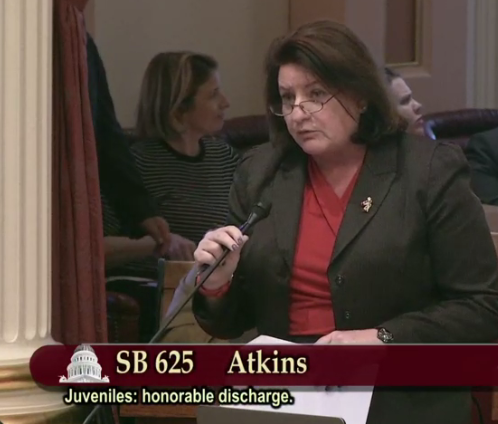
SB 437: This bill improves the effectiveness of a joint working group of the Department of Managed Healthcare and the Department of Insurance. It does this by requiring the group to review two new topics: grievance and consumer-complaint processes that pertain to timely access to care, and state implementation of federal healthcare reforms.
SB 462: This modest but necessary bill clarifies that probation departments may access juvenile case files in order to comply with reporting requirements. It also allows courts to authorize probation departments to engage third-party researchers for limited access to juvenile case files to conduct research on juvenile-justice populations and the programs that serve them. SB 462 ensures that no personally identifying information from a juvenile case file may be released, disseminated, or published.
SB 587: Currently, probation officers are not permitted to display blue warning lights on their certified emergency vehicles, as other law-enforcement officers are. But probation officers at times are called on to respond in emergency situations, and without blue lights, they’re not able to alert other officers and the public when responding that they are peace officers and are there to assist. The bill would allow probation officers, after completing appropriate training, to display blue warning lights on their emergency vehicles.
SB 625: This bill would reestablish an “honorable discharge” program for juvenile offenders who meet certain criteria, paving an easier path for them to access higher education or vocational training or get a job after their release from incarceration.
The following bills are in the Assembly Appropriations Committee until September 1st:
SB 179: The Gender Recognition Act, SB 179, would make California the second state in the country, behind Oregon, to allow nonbinary residents – those who self-identify as neither male nor female – to choose a third gender marker on driver’s licenses and the first to allow it on other state-issued identity documents, such as birth certificates. It would also make it easier for transgender, intersex or nonbinary Californians to obtain state identification documents that accurately reflect their gender, removing several barriers that make it onerous for people seeking name- and gender-change court orders or seeking a gender change on birth certificates, driver’s licenses, and identity cards.
SB 223: When it comes to healthcare regulation, state and federal laws are not completely in alignment. In some ways, the federal Affordable Care Act is stronger than state law in nondiscrimination protections and language-services standards. SB 223 would require most health plans in California to meet the highest standards in nondiscrimination measures, consumer protections, and language-assistance services – no matter what changes might occur to the Affordable Care Act. It would ensure equal access to affordable healthcare regardless of race, religion, national origin, ethnicity, age, sex, sexual orientation, or disability.
SB 310: Transgender people who are incarcerated should have the same right as anyone else to legally change their name or gender and to be recognized for who they are. SB 310 – the Name and Dignity Act – establishes the right of people incarcerated in state prisons and county jails to access the courts to obtain a name or gender change. It also requires corrections officials to use the new name of a prisoner who has successfully obtained a name change. In addition to providing transgender prisoners with a sense of dignity while incarcerated, SB 310 will increase the chances for them to successfully reenter society.
SB 379: This bill makes minor changes to current law that could have major impacts on our children’s oral health in the future. SB 379 allows schools to facilitate dental screenings by requiring parents to opt-out if they do not want their children to receive an assessment. However, any treatment of students would still require prior consent. It also adds data on tooth decay to the list of data that must be reported to the county and encourages schools to send oral-health data to the state. The bill will allow us to screen more children, which will in turn lead to more treatment, better collection of statewide data, and improved overall oral-health strategies.
SB 548: Unfair labor practice charges in the public sector are generally handled by the Public Employment Relations Board (PERB). However, despite the important role that PERB plays in resolving labor disputes, the organization’s staffing has not kept pace with its workload, and it can take up to six months for a claim to be resolved. SB 548 addresses this problem by ensuring that cases related to bad-faith bargaining are eligible to be expedited within PERB. Under the bill, if an organization files a relevant charge, PERB must determine whether the case is eligible to be expedited within five days. If so, PERB must render a final decision within 150 days of the request.
SB 667: The Riverine Stewardship Assistance Program (RSAP) was created in the 2016-17 state budget. SB 667 enables the program to move forward. The RSAP provides technical and financial support for stream restoration, reduced flood risk and improved habitat corridors, empowering communities to reconnect with and take pride in their neighborhood waterways.
This bill has passed the Assembly and is on its way to the governor for his signature:
SB 285: Currently, public employers are barred from interfering with, intimidating, restraining, coercing, or discriminating against employees while those employees are exercising their right to have union representation. SB 285 strengthens the law by making it clear that not only do public employees have the right to form a union or engage in union activities without interference – they also have the right to become members or remain as members of a union without interference, intimidation, or coercion.
In 2003, the Cedar fire became one of the most devastating wildfires in California history, scorching more than 280,000 acres in San Diego County and destroying 2,820 homes. Fifteen people lost their lives. The fire started in October. Four years later, the Witch Creek and Harris fires combined to burn more than 288,000 acres in San Diego County and destroy more than 1,300 homes. Seven people died. Those fires also started in October.
Fall is fire season, and the fact that hundreds of thousands of San Diego County trees have died in recent years – as a result of prolonged drought and voracious beetles – isn’t helping. September is a great time to make sure you are prepared for fire season.
Under state law, residents are required to create 100 feet of defensible space around their homes. Creating defensible space means mowing and properly maintaining your lawns and keeping weeds under control, pruning or removing ignitable trees and shrubs, keeping stacked firewood away from your home and making sure your home’s address is visible to first responders in the event of an emergency.
The County of San Diego maintains a good website that explains how to make your home as fire-resistant as possible, as well as providing a wildfire hazard map tool and helpful information on how to create a family disaster plan. Visit the website at readysandiego.org/wildfire.
My district staff is always available to help constituents navigate a complex web of state agencies.
In August, a constituent appeared at our office armed with a notice from the California Department of Tax and Fee Administration, informing him that he was being charged a Fire Prevention Fee – in addition to a late penalty, plus interest. The constituent didn’t think he should have to pay the penalty because the notice he received was the first time he’d heard about the fee.
My staff contacted the department on his behalf and discovered that the original notice was sent to the wrong mailing address. The department agreed to remove the penalty and the interest from the constituent’s bill.
This is a good opportunity to note that, due to the passage of AB 398 this year, as of July 1st, 2017, there are no more Fire Prevention Fee billings. All billings for periods prior to July 1st, 2017, remain in effect and are due and payable. For more on the Fire Prevention Fee, visit http://www.boe.ca.gov/sptaxprog/fire_prev_fee.htm.
If you’re having trouble working out an issue with any state agency, please call my office at 619-645-3133, and my staff will do everything in their power to help.
My District Staff
Myrna Zambrano: District Director
Deanna Spehn: Policy Director
Jason Weisz: Senior Field Representative
Toni Duran: Field Representative
Chevelle Tate: Field Representative
Ryan Trabuco: Scheduler / Field Representative
David Rolland: Communications Director
Where to Find Me Online
Twitter: @SenToniAtkins
Facebook: facebook.com/SDToni/
Web: senate.ca.gov/atkins
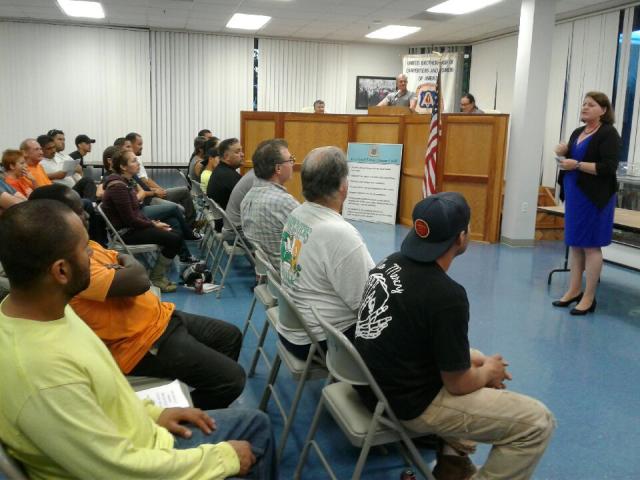
Talking construction -- housing, water, infrastructure -- with the men and women of Southwest Carpenters Local 547.

Spent a beautiful day celebrating the rich history and diverse cultures of southeastern San Diego at the Diamond Street Festival.
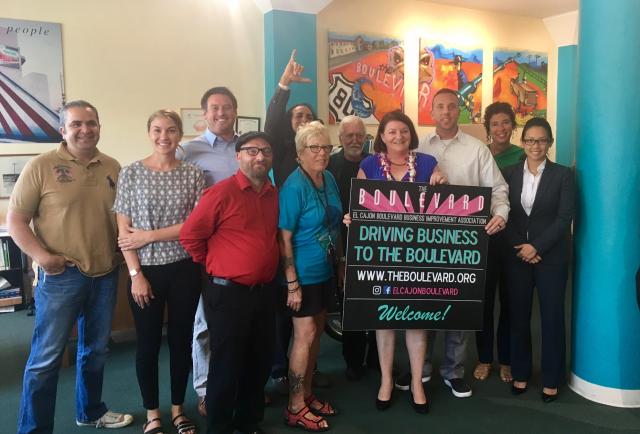
It’s always nice to meet with the El Cajon Blvd Business Improvement Association and hear their plans to grow the Boulevard economy.
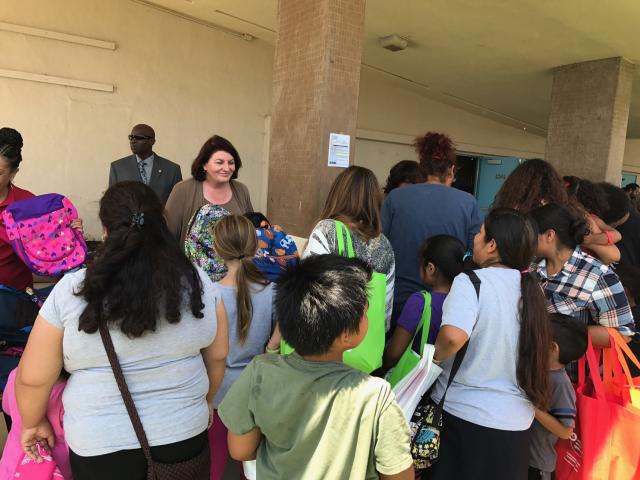
I had a great time handing out backpacks to kids at a Health Fair & Back-to-School Kickoff.
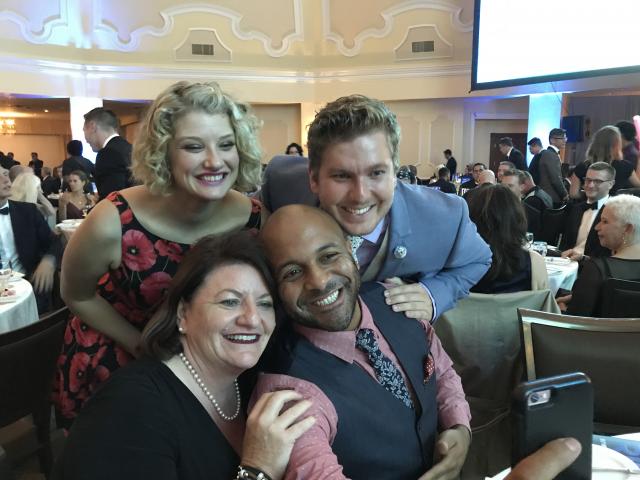
It was such an honor to receive the Human Rights Campaign Leader for Equality Award at HRC’s RISE Gala in August.
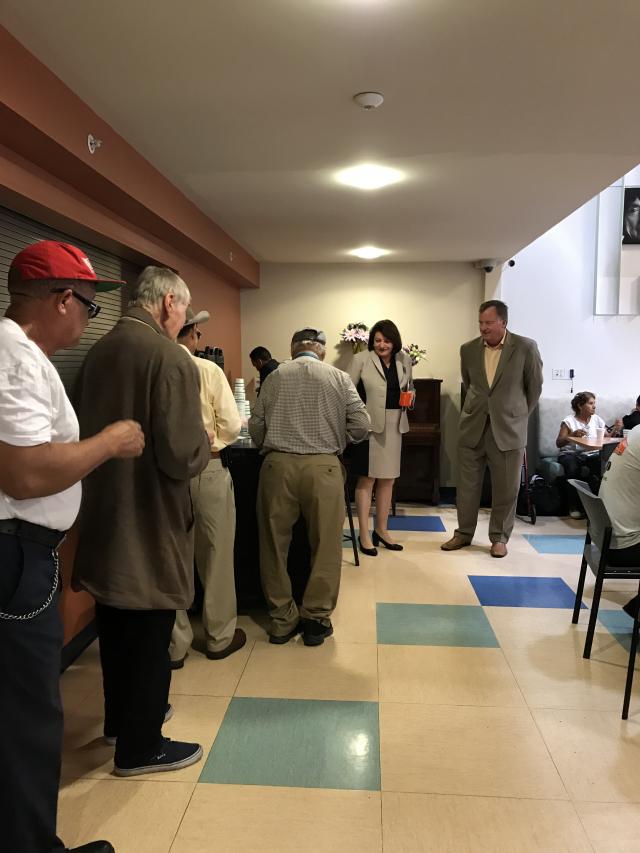
It was great to stop by Serving Seniors, help serve a meal and talk with folks. Housing is definitely the No. 1 issue on their minds.
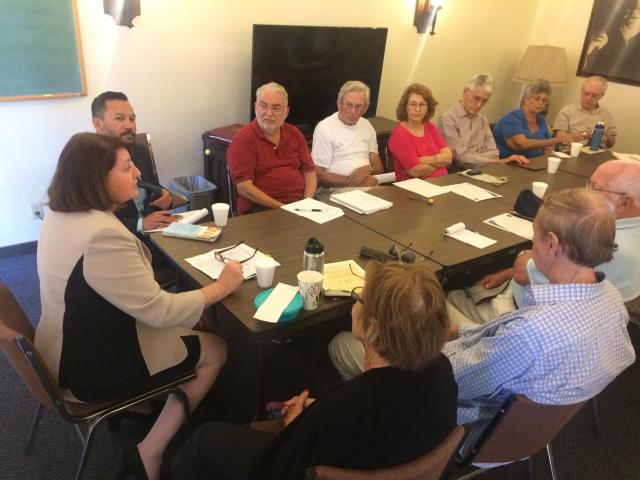
What a pleasure it was talking with Rancho Bernardo residents about federal-state relations, education, healthcare and housing.
